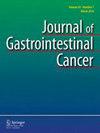COVID-19大流行期间与邮寄粪便免疫化学检验接受率相关的社会人口因素:药物使用与年轻人筛查完成率降低有关。
IF 1.6
Q4 ONCOLOGY
Journal of Gastrointestinal Cancer
Pub Date : 2024-09-01
Epub Date: 2024-05-01
DOI:10.1007/s12029-024-01057-z
引用次数: 0
摘要
本文章由计算机程序翻译,如有差异,请以英文原文为准。
Sociodemographic Factors Associated with Mailed Fecal Immunochemical Testing Uptake During the COVID-19 Pandemic: Substance Use Linked to Reduced Screening Completion in Younger Adults.
求助全文
通过发布文献求助,成功后即可免费获取论文全文。
去求助
来源期刊

Journal of Gastrointestinal Cancer
ONCOLOGY-
CiteScore
3.80
自引率
0.00%
发文量
121
期刊介绍:
The Journal of Gastrointestinal Cancer is a multidisciplinary medium for the publication of novel research pertaining to cancers arising from the gastrointestinal tract.The journal is dedicated to the most rapid publication possible.The journal publishes papers in all relevant fields, emphasizing those studies that are helpful in understanding and treating cancers affecting the esophagus, stomach, liver, gallbladder and biliary tree, pancreas, small bowel, large bowel, rectum, and anus. In addition, the Journal of Gastrointestinal Cancer publishes basic and translational scientific information from studies providing insight into the etiology and progression of cancers affecting these organs. New insights are provided from diverse areas of research such as studies exploring pre-neoplastic states, risk factors, epidemiology, genetics, preclinical therapeutics, surgery, radiation therapy, novel medical therapeutics, clinical trials, and outcome studies.In addition to reports of original clinical and experimental studies, the journal also publishes: case reports, state-of-the-art reviews on topics of immediate interest or importance; invited articles analyzing particular areas of pancreatic research and knowledge; perspectives in which critical evaluation and conflicting opinions about current topics may be expressed; meeting highlights that summarize important points presented at recent meetings; abstracts of symposia and conferences; book reviews; hypotheses; Letters to the Editors; and other items of special interest, including:Complex Cases in GI Oncology: This is a new initiative to provide a forum to review and discuss the history and management of complex and involved gastrointestinal oncology cases. The format will be similar to a teaching case conference where a case vignette is presented and is followed by a series of questions and discussion points. A brief reference list supporting the points made in discussion would be expected.
 求助内容:
求助内容: 应助结果提醒方式:
应助结果提醒方式:


